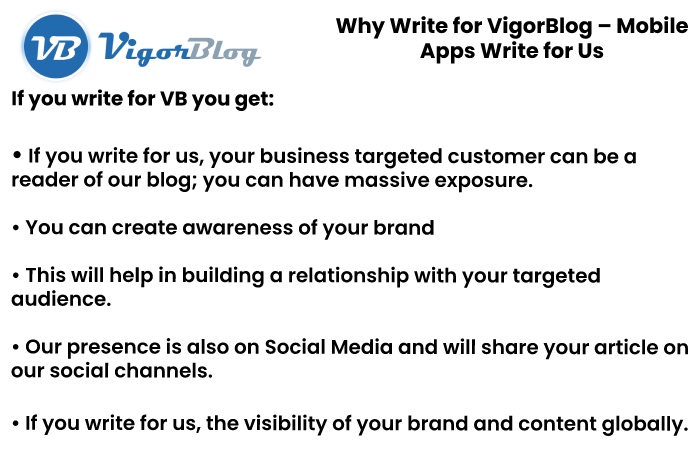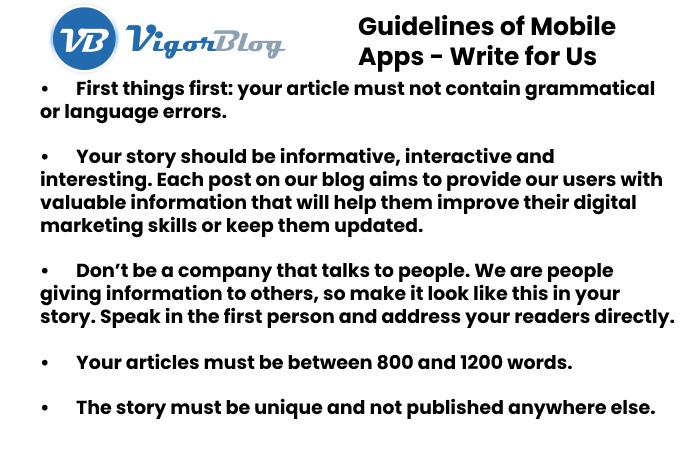Mobile Apps Write For Us
Mobile Apps Write For Us
We Vigor Blog, where mobile app enthusiasts come to read every day for original and inspiring news that provides actionable insights. As a guest contributor, you will write for an audience that lives, eats, and breathes cutting-edge technology. So if you think you have it in you, write to us!
If you want to contribute to brand awareness and lead generation for your web blog or products, then our blog and mobile apps write for our sites will help you generate leads for your company at a low cost and get new users on your web page. In addition, you can improve your site’s on-page and off-page SEO scores, which will be helpful in the search ranking. Unfortunately, few sites also provide backlinks, whether it is a nofollow or dofollow.
Topics We Cover:
Our general blog different caters to topics articles like the newest fashion and food blogs, articles related to parenting and health, nursing, beauty and skin, architecture and interior and exterior design ideas, business, automotive/automobiles, graphics, digital marketing, artificial intelligence (A.I.), education, social media, diseases, web development, web design, products, gadgets, apps-reviews, skincare and haircare posts, conversions, and marketing blogging. Moreover, cyber-attacks/data breaches, the Internet of Things, remote working, and entertainment are the topics we publish on our website Vigor Blog.
How To Submit An Article?
To Submit Your Articles, you can email us at contact@vigorblog.com
About Mobile Apps
 A mobile application is also known as mobile apps. It is meant to run on a mobile device, such as a tablet computer or a smartphone. Furthermore, the applications are compact software units with the restricted capability to provide the most significant user experience and services.
A mobile application is also known as mobile apps. It is meant to run on a mobile device, such as a tablet computer or a smartphone. Furthermore, the applications are compact software units with the restricted capability to provide the most significant user experience and services.
The functionality of mobile applications is constrained and confined. Because mobile apps have limited hardware resources, they do not exhibit multifunctionality.
Types of Mobile Apps?
Mobile apps come in a variety of sizes and shapes. Let’s look at the most common forms of mobile applications to learn about the most recent trends in the mobile app world.
Native Apps
Native apps are created specifically for the operating system of a mobile device (OS). Because they are designed for a single platform, you cannot use a Blackberry app on an Android phone or an iOS app on a Windows phone. As a result, you can have native Android mobile apps and native iOS apps, not to mention all the other platforms and devices.
Advantages of Native Apps:
- Fast performance due to simple code that is device and OS-specific.
- More effective use of the operating system and device-specific features.
- User interface/UX that is interactive.
- Fewer compatibility difficulties and quicker configuration.
Disadvantages of Native Apps:
- The development of OS-specific apps might be time-consuming.
- Operating system-specific programming languages such as Swift and Java are challenging to master.
- Increased release cycle length to guarantee stability.
- Adding new features necessitates a different codebase.
Web Apps
A web application is an internet-enabled application that runs in a web browser and is designed to work on various devices regardless of the operating system. Web apps can also be referred to as web-fronted apps or web-based apps. On the other hand, a web application is not the same as a mobile website.
Advantages of Web Apps:
- Reduced business cost.
- There is no requirement for installation.
- Greater accessibility because it may be accessed from anywhere.
- Constantly up to date.
Disadvantages of Web Apps:
- Web apps fail to work when you are offline.
- A limited number of functionalities as compared to Native apps.
- It takes more time to develop.
- There is a security risk.
Hybrid Apps
Hybrid apps combine the best features of both native and online apps, native apps, are expressly created for a mobile operating system, and can access device features. These web apps have been placed within a native container and may be downloaded and installed on a device, unlike web applications.
Advantages of Hybrid Apps:
- Simple to build
- Can work without an internet connection
- Because of the shareable codes, this alternative is less expensive.
- Because it may be implemented for many operating systems, it requires a shorter time to market.
- A single code base enables the addition of additional functionalities.
Disadvantages of Web Apps:
- Cannot perform OS-specific activities
- More expensive than web applications
- Complex functions tend to slow down the app.
- Less interactive than native apps
Why Write for Us – Mobile Apps Write for Us

What Do You Get For Writing An Article For Us?
Guest Posting is allowed for severely informational content- promotional content is available for sponsored posts on a first-come, first-serve basis. We will give you credibility for writing guest posts in addition to the following items:
- We can post a Professionally Edited article on Global’s Site and reach 5,000+ users/per month.
- Increase your Reputation Online by including an author, company bio, and professional profile picture.
- Our blog has an extensive audience, and our readership continues to grow. Our guest posts get massive traffic.
- Improve Reach of Social Media Channels by Including links to your Facebook, Instagram, LinkedIn, Twitter, YouTube, or any other approved Social Channel.
- Get a suitable referral hyperlink: Submit a visitor and get exceptional hyperlinks using visitor publish. And get more significant visitors to your site.
- Natural backlink: Get a natural hyperlink; it undoubtedly facilitates boosting the cost of your website. And you realize that Google counts the number of visitors published as a hyperlink.
- Lifetime: Your article will be publish on our website for your entire life.
Search Terms Related to Mobile Apps Write for Us
Best productivity apps
Top fitness apps
Meditation apps for beginners
Photo editing apps for Android/iOS
Expense tracker apps
Language learning apps
Educational apps for kids
Time management apps
Best travel apps
Social networking apps
Weather apps for Android/iOS
Mobile banking apps
Navigation apps
Food delivery apps
Best dating apps
Note-taking apps
Health and wellness apps
Budgeting apps
Podcast apps
E-book reader apps
Search Terms for Mobile Apps Write for Us
Mobile Apps Write for Us
Write for Us Mobile Apps
Mobile Apps Guest Post
Guest Post Mobile Apps
Mobile Apps Contribute
Contribute Mobile Apps
Mobile Apps Submit Post
Submit Post Mobile Apps
Mobile Apps submit an article
Submit an article Mobile Apps
Mobile Apps become a guest blogger
A guest blogger Mobile Apps
Mobile Apps writers wanted
Wanted writers Mobile Apps
Mobile Apps suggest a post
Suggest a post Mobile Apps
Mobile Apps guest author
Guest author Mobile Apps
Guidelines of the Article – Mobile Apps Write for Us

You can send your article to contact@vigorblog.com
Related Pages:

